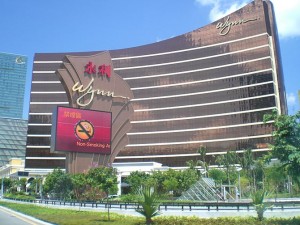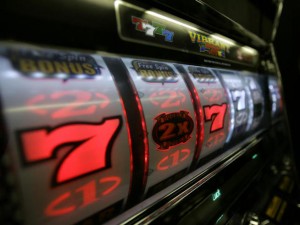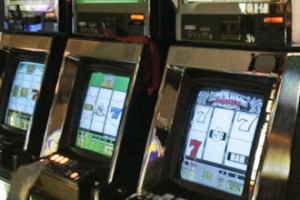Monmouth Park may have been stayed from offering NFL and World Series bets, among others, but state Sen. Raymond Lesniak (D) isn’t giving up fighting the good fight, describing it as “the last hurrah.” Describing an Atlantic City that’s devoid of life during major sports events, he envisions bringing players back to the Boardwalk to put some action on, say, March Madness. Sports wagering would be confined to tracks and casinos to “put fannies in the seat,” to help restore their financial health. OTB and betting parlors need not apply.
For now, Monmouth Park says it wants “the whole enchilada” of sports but Lesniak thinks that, as the court case moves forward, Monmouth Park may take wagers on soccer and NASCAR, deciding half an enchilada is better than none. (Nevada Sen. Harry Reid [D] puts in a cameo appearance as Special Guest Villain.)
* Casino revenue is still king at Wynn Resorts, where coin-in, win per slot per day  ($277) and table hold all increased in 3Q14. Even with a $35 million decline in table drop, Steve Wynn‘s casinos grossed $212 million from gambling and $196 million from food, retail and entertainment. His hotel rooms also had a good quarter, with ADRs up to $267 from $250 and revenue per available room increasing to $238 from $220. Wynn posted a handsome profit of $253 million. A $35 million (8%) increase in Wynncore revenue more than made up for a small dropoff at Wynn Macau — hardly even a speed bump.
($277) and table hold all increased in 3Q14. Even with a $35 million decline in table drop, Steve Wynn‘s casinos grossed $212 million from gambling and $196 million from food, retail and entertainment. His hotel rooms also had a good quarter, with ADRs up to $267 from $250 and revenue per available room increasing to $238 from $220. Wynn posted a handsome profit of $253 million. A $35 million (8%) increase in Wynncore revenue more than made up for a small dropoff at Wynn Macau — hardly even a speed bump.
* With consumer confidence standing at 82 and unemployment down to 6.4%, the question arises: Why haven’t slot revenues recovered? For example, Connecticut slot  revenues are down 7% this year despite the absence of new competition. Andrew Klebanow examines the issue and finds that “the price of those gaming experiences” is the culprit. In other words, double-digit increases in the rate of slot hold are giving the player less value for his money. (For instance, Illinois‘ rate went from 6.5% to 9%, a 38% price increase.)
revenues are down 7% this year despite the absence of new competition. Andrew Klebanow examines the issue and finds that “the price of those gaming experiences” is the culprit. In other words, double-digit increases in the rate of slot hold are giving the player less value for his money. (For instance, Illinois‘ rate went from 6.5% to 9%, a 38% price increase.)
Noting that prices can be “judiciously increased” without customer resistance, Klebanow adds, “There is a point, though, where pricing becomes inelastic, and at that point consumers decide there is no longer enough value in the product to justify the higher price. That is what appears to be happening to slot machine gaming.” Klebanow blames the switch to ticket-in, ticket-out machines and to ‘Australian-style’ slots, with  their low denominations and multiple video-screen paylines. He writes, “Today, it is not unusual to find penny games holding in excess of 12 percent, even though their average wager is greater than $4.”
their low denominations and multiple video-screen paylines. He writes, “Today, it is not unusual to find penny games holding in excess of 12 percent, even though their average wager is greater than $4.”
Operators are also faulted for squeezing players ever so subtly during the bountiful 2004-07 era, as greed got the better of the industry. Meanwhile, the multi-line machines kept chipping away at the volatility of the slots. Klebanow sees the gaming industry herding players toward a tipping point where they no longer find value in the casino experience. I hope he’s wrong but he knows more than I do.

